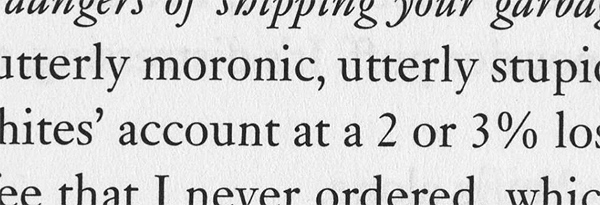 Though it’s amazing to imagine, there are some people who are against close reading in literary criticism. A friend who attended a panel on long-form book reviewing recently reported that many of the panelists, a number of them editors who oversee the publication of long review essays, preferred their reviewers to limit the practice (to be clear, close reading is an editorially encouraged feature of reviews of fiction that run in this magazine). I wasn’t privy to the debate that may have followed, but the notion that one wouldn’t spend a good percentage of one’s critical real estate on a careful examination of a writer’s prose and its effects is, from where I sit, a real jaw-dropper.
Though it’s amazing to imagine, there are some people who are against close reading in literary criticism. A friend who attended a panel on long-form book reviewing recently reported that many of the panelists, a number of them editors who oversee the publication of long review essays, preferred their reviewers to limit the practice (to be clear, close reading is an editorially encouraged feature of reviews of fiction that run in this magazine). I wasn’t privy to the debate that may have followed, but the notion that one wouldn’t spend a good percentage of one’s critical real estate on a careful examination of a writer’s prose and its effects is, from where I sit, a real jaw-dropper.
It may well be that, like “ultimate fighting,” “close reading” may not mean the same thing to all comers. And yet, as I type that attempt at large-heartedness, I sense it’s misplaced. I think it more likely that there’s a philosophical difference out there over what responsibility a reader has to a book. “For the real use of imaginative reading is precisely to suspend one’s mind in the workings of another sensibility,” wrote Guy Davenport, “to give oneself over to Henry James or Conrad or Ausonius, to Yuri Olyesha, Basho, and Plutarch.” That suspension in the reading process, the floating state of being not of one’s own mind, is a pleasure that some, superstitiously I suppose, might not wish to probe too precisely. The rationale would be that to look too carefully would be to demystify this magical levitation, to send the thing crashing to the ground.
That’s pure malarky. Criticism that doesn’t read closely isn’t literary criticism. If it’s anything, it’s personal essay—a perfectly admirable category of thing, and a perfectly reasonable form in which a writer can write about reading as an experience—but not literary criticism. Consider Guy Davenport’s personal essay, “On Reading,” in which one finds the following:
Last year I met a young man in his twenties who is illiterate; there are more illiterates in Kentucky than anywhere else, with the possible exception of the Philippines and Haiti. The horror of his predicament struck me first of all because it prevents his getting a job, and secondly because of the blindness it imposes on his imagination. I also realized more fully than ever before what a text is and how it can only be realized in the imagination, how mere words, used over and over for other purposes and in other contexts, can be so ordered by, say, Jules Verne, as to be deciphered as a narrative of intricate texture and splendid color, of precise meaning and values. At the time of the illiterate’s importuning visits (I was trying to help him find a job) I was reading Verne’s Les enfants du capitaine Grant, a geography book cunningly disguised as an adventure story, for French children, a hefty two volume work. I had never before felt how lucky and privileged I am, not so much for being literate, a state of grace that might in different circumstances be squandered on tax forms or law books, but for being able, regularly, to get out of myself completely, to be somewhere else, among other minds, and return (by laying my book aside) renewed and refreshed.
Good and clear and right as this is, it is a description of the reading experience, and a stipulation of the pleasures of such experience, not an anatomy of a particular reading experience. That’s something we go to criticism for: to see how something works when it works well, and to point to and probe at things that one doesn’t feel work at all. Either maneuver demands precision, and “close reading”, so called, is a description, however vague, of the attitude such an undertaking demands: a nearness to the thing, a nearness that requires quotation and scrutiny thereof.
Of course, one needn’t read literary criticism to be a good reader, any more than one needs to understand pH levels in garden soil to enjoy a good garden tomato. But if you plan on growing your own, or presume to advise those who do….
































































































